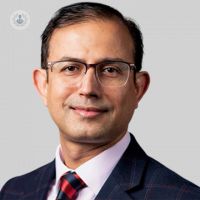All about evidence-based management of lateral thigh pain
Written in association with:Lateral thigh pain, often linked to conditions like iliotibial band syndrome (ITBS) and greater trochanteric pain syndrome (GTPS), can significantly impact daily activities and athletic performance. Implementing evidence-based management strategies ensures effective treatment and faster recovery. In this article, esteemed consultant trauma and orthopaedic surgeon, Mr Muhammad Adeel Akhtar, outlines key approaches to managing lateral thigh pain, grounded in scientific research.

Diagnosis
Accurate diagnosis is crucial for effective treatment. Clinical evaluation includes patient history, physical examination, and diagnostic imaging if necessary. Common causes such as ITBS, characterised by pain on the outer side of the thigh, and GTPS, marked by tenderness over the greater trochanter, should be identified. Diagnostic tools like MRI or ultrasound can confirm the presence of tendinopathy or bursitis, guiding targeted treatment.
Conservative treatments
Rest and activity modification: Initial management often involves reducing activities that exacerbate symptoms, such as running or cycling. Gradually resuming activity as pain subsides helps prevent recurrence.
Physical therapy: Structured exercise programmes tailored to the individual are a cornerstone of treatment. Strengthening exercises for the hip abductors, gluteus medius, and quadriceps, along with stretching routines for the iliotibial band and surrounding muscles, are beneficial. Evidence suggests that supervised physiotherapy yields better outcomes compared to unsupervised exercise.
Non-steroidal anti-inflammatory drugs (NSAIDs): NSAIDs can help reduce pain and inflammation, offering short-term relief. However, long-term use should be avoided due to potential side effects.
Advanced Interventions
Corticosteroid injections: For patients not responding to conservative treatments, corticosteroid injections may provide significant relief, particularly for GTPS. These injections reduce inflammation and pain, but their benefits should be weighed against potential risks, including tendon weakening.
Platelet-rich plasma (PRP) therapy: Emerging evidence supports PRP therapy, which involves injecting a concentration of the patient's own platelets to promote healing. Studies indicate that PRP can be effective for chronic tendinopathies when other treatments fail.
Prevention and long-term management
Biomechanical assessment: Identifying and correcting biomechanical issues, such as improper footwear or running techniques, can prevent recurrence. Gait analysis and custom orthotics may be recommended.
Education and self-management: Educating patients about the importance of proper training techniques, adequate warm-up, and cool-down routines can empower them to manage symptoms and prevent future episodes.


